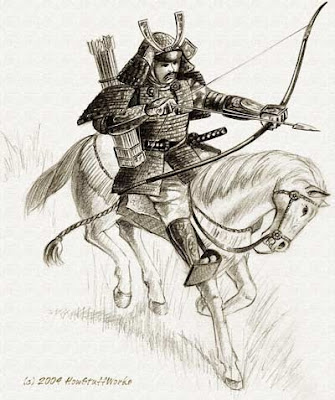Samurai (侍 or 士) Is the term for the elite class of military officers before the era of industrialization in Japan. The word "samurai" comes from the verb "samorau 'ancient Japanese origin, changed to" saburau' which means "serve", and eventually became "samurai" who worked as a maid for the master.
A more appropriate term is Bushi (武士) (literally: "armed men") that is used during the Edo period. However, the term used for samurai warrior elite of society, and not for example, ashigaru or foot soldiers. Samurai are not tied to the clan or working for the employer (the daimyo) is called a ronin (literally: "the wave"). Samurai who served in the region called hanshi han.

Samurai is considered to be polite and educated, and during the Tokugawa shogunate gradually lost their military function. Samurai At the end of the Tokugawa era, samurai in general is common to kakitangan daimyo, with their swords only for customs purposes. With the Meiji reforms in the late 19th century, the samurai class was abolished as a distinct and replaced with a national army to resemble Western countries. However, the strict nature of the samurai, known as bushido still present in contemporary Japanese society, as aspects of their lifestyle others.
A more appropriate term is Bushi (武士) (literally: "armed men") that is used during the Edo period. However, the term used for samurai warrior elite of society, and not for example, ashigaru or foot soldiers. Samurai are not tied to the clan or working for the employer (the daimyo) is called a ronin (literally: "the wave"). Samurai who served in the region called hanshi han.

Samurai is considered to be polite and educated, and during the Tokugawa shogunate gradually lost their military function. Samurai At the end of the Tokugawa era, samurai in general is common to kakitangan daimyo, with their swords only for customs purposes. With the Meiji reforms in the late 19th century, the samurai class was abolished as a distinct and replaced with a national army to resemble Western countries. However, the strict nature of the samurai, known as bushido still present in contemporary Japanese society, as aspects of their lifestyle others.



